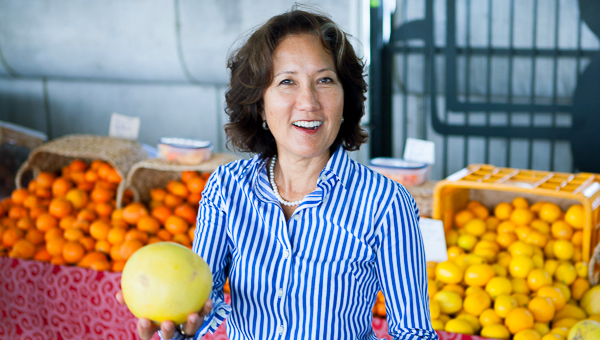Growing up in Hawaii, Paula Daniels was taught the importance of malama aina – stewardship of the land – by her grandfather, and heard her father’s stories about being raised on a sugar-cane plantation. After becoming an entertainment attorney, she eventually made her way back to environmental concerns, serving as president of Heal the Bay, as a member of the California Coastal Commission and on the California Bay-Delta Authority, the state water-resources board.
That community work led her to realize how food policies affect agriculture, and to see that in Los Angeles many don’t eat locally grown produce and low-income adults often don’t have access to and can’t afford nutritious food.
To address this issue, Daniels was instrumental in helping former Los Angeles Mayor Antonio Villaraigosa create the Los Angeles Food Policy Council in 2010. Two years later, it became a project of Community Partners.
“More and more we’re recognizing that the whole system needs to work better to address the struggling and broken ends ─ both the lower income consumers and small and mid-size farmers,” says Daniels, who currently serves as LAFPC chair.
Already, LAFPC is seen as a model for the approximately 200 food policy councils nationwide, according to Daniels.
Its successes have been significant, including encouraging the Los Angeles Unified School District, the largest food provider in the city, to increase its local purchases of fruit and vegetables from nine percent to 70 percent of its $20-million annual produce budget.
That was achieved through LAFPC’s Good Food Purchasing Program, which asks large institutions to sign a pledge to buy food that supports local economies, is environmentally sustainable, values workers, protects animal welfare and is nutritious. A total of seven institutions have signed on.
Another cutting-edge LAFPC initiative seeks to change fast-food dominated convenience stores into healthy food community markets. Store owners receive technical, financial and community-outreach assistance to transform their businesses.
Through all of LAFPC’s efforts, “Community Partners has given us a lot of guidance in fund development, basic human-resources processes and relationship-building,” Daniels said.
Looking to the future, Daniels sees “food councils linking together nationally to have a significant influence on agricultural policy.”





